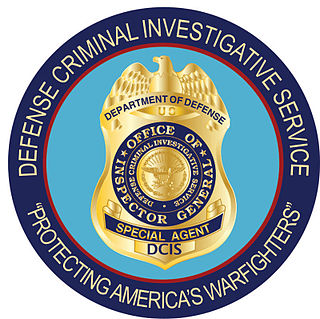
The Defense Criminal Investigative Service (DCIS) is the criminal investigative arm of the Office of Inspector General, U.S. Department of Defense. DCIS protects military personnel by investigating cases of fraud, bribery, and corruption; preventing the illegal transfer of sensitive defense technologies to proscribed nations and criminal elements; investigating companies that use defective, substandard, or counterfeit parts in weapon systems and equipment utilized by the military; and stopping cyber crimes and computer intrusions.

The Office of the Secretary of Defense (OSD) is a headquarters-level staff of the United States Department of Defense. It is the principal civilian staff element of the U.S. Secretary of Defense, and it assists the Secretary in carrying out authority, direction and control of the Department of Defense in the exercise of policy development, planning, resource management, fiscal, and program evaluation responsibilities. OSD is the Secretary of Defense's support staff for managing the Department of Defense, and it corresponds to what the Executive Office of the President of the U.S. is to the U.S. president for managing the whole of the Executive branch of the federal government.

Tricare is a health care program of the United States Department of Defense Military Health System. Tricare provides civilian health benefits for U.S Armed Forces military personnel, military retirees, and their dependents, including some members of the Reserve Component. Tricare is the civilian care component of the Military Health System, although historically it also included health care delivered in military medical treatment facilities.
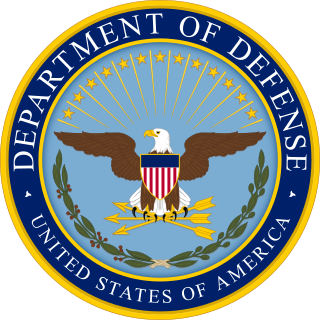
The United States under secretary of defense for policy (USDP) is a high level civilian official in the United States Department of Defense. The under secretary of defense for policy is the principal staff assistant and adviser to both the secretary of defense and the deputy secretary of defense for all matters concerning the formation of national security and defense policy.

The Defense Manpower Data Center (DMDC) serves under the Office of the Secretary of Defense to collate personnel, manpower, training, financial, and other data for the Department of Defense. This data catalogues the history of personnel in the military and their family for purposes of healthcare, retirement funding and other administrative needs. It has offices in Seaside, California and Alexandria, Virginia.
The Assistant Secretary of Defense for Networks & Information Integration (ASD(NII)) was an appointed position that provided management and oversight of all DoD information technology, including national security systems. The ASD(NII) also served as the chief information officer (CIO) of the United States Department of Defense (DoD), a position distinct from the ASD and governed by the Clinger-Cohen Act.
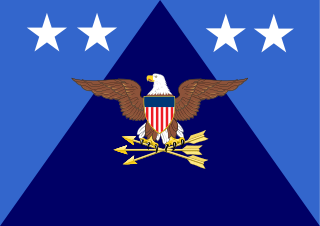
The under secretary of defense for personnel and readiness, or USD (P&R) is a high-ranking civilian position in the Office of the Secretary of Defense (OSD) within the United States Department of Defense responsible for advising the secretary and deputy secretary of defense on recruitment, career development, pay and benefits, and oversight of the state of military readiness. The under secretary is appointed from civilian life by the president and confirmed by the Senate to serve at the pleasure of the President.
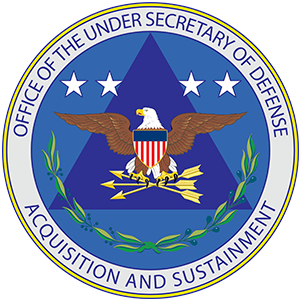
The Under Secretary of Defense for Acquisition and Sustainment, or USD (A&S), is the Principal Staff Assistant (PSA) and advisor to the Secretary of Defense for all matters relating to acquisition and sustainment in the Department of Defense. This includes the DoD Acquisition System; system design and development; production; logistics and distribution; installation maintenance, management, and resilience; military construction; procurement of goods and services; material readiness; maintenance; environment and energy resilience ; utilities; business management modernization; International Armaments Cooperation, Cooperative Acquisition and International Agreements, Promoting exportability of military components to allies and partners; nuclear, chemical and biological defense programs; and nuclear command, control, and communications.
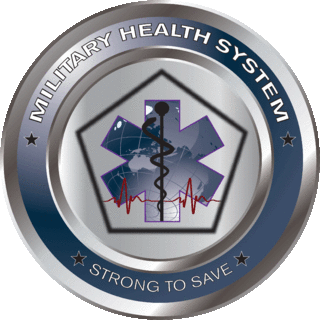
The Military Health System (MHS) is a form of nationalized health care operated within the United States Department of Defense that provides health care to active duty, Reserve component and retired U.S. Military personnel and their dependents.

Rear Admiral Edward Dana Martin is the former Acting Assistant Secretary of Defense. He was appointed to two terms, originally in 1993 and again in 1997. Martin served as the Secretary's principal advisor on matters related to the military health system, health.mil. The Military Health System's (MHS) mission is to provide optimal health services in support of the United States' military mission. The MHS is a unique partnership of medical educators, medical researchers, healthcare providers and their support personnel worldwide. This DoD enterprise consists of the Office of the Assistant Secretary of Defense ; the medical departments of the Army, Navy, Marine Corps, Air Force, Coast Guard, and Joint Chiefs of Staff; the Combatant Command surgeons; and TRICARE providers.
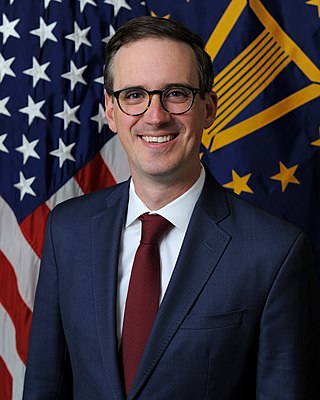
The Assistant to the Secretary of Defense for Public Affairs, or ATSD (PA), is the principal staff advisor and assistant to the Secretary of Defense and Deputy Secretary of Defense for public information, internal information, community relations, information training, and audiovisual matters in support of Department of Defense activities, leading a worldwide public affairs community of some 3,800 military and civilian personnel. The Assistant to the Secretary follows the Secretary's Principles of Information in providing Defense Department information to the public, the United States Congress and the media.
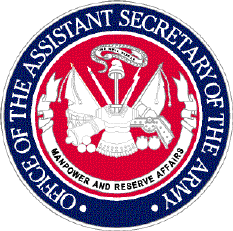
The Assistant Secretary of the Army (Manpower and Reserve Affairs), abbreviated as ASA(M&RA), is a civilian official in the United States Department of the Army.
The Assistant Secretary of Defense for Global Strategic Affairs, or ASD(GSA), is a position in the Office of the Secretary of Defense that develops policy for the Secretary on countering weapons of mass destruction, nuclear forces and missile defense, cyber security and space issues. ASD(GSA) is currently tasked with three major congressionally mandated reviews: the Nuclear Posture Review, the Ballistic Missile Defense Review, and the Space Posture Review. In addition, GSA is the Defense Department's lead in developing the DoD's cybersecurity strategy, and for crafting the policy for the standup of the new Cyber Command. ASD(GSA) answers to the Under Secretary of Defense for Policy. Although ASD(GSA) is a recently configured office, its functional responsibilities can be traced back in part to a position eliminated in early 2008, the 'Assistant Secretary of Defense for International Security Policy'
In the United States military, the Assistant Secretary of Defense for Manpower and Reserve Affairs(ASD ), formerly Assistant Secretary of Defense for Reserve Affairs(ASD ) serves as Principal Staff Assistant and advisor to the Secretary of Defense, Deputy Secretary of Defense and Under Secretary of Defense for Personnel and Readiness, with responsibility for "overall policies and procedures of [U.S.] Total Force manpower, personnel and reserve affairs," including the Army National Guard, Army Reserve, Navy Reserve, Marine Corps Reserve, Air National Guard, Air Force Reserve and Coast Guard Reserve. The ASD (M&RA) reports directly to the Under Secretary of Defense (P&R) and exercises authority, direction, and control over the National Committee for Employer Support of the Guard and Reserve. On September 16, 2022, President Biden announced his intent to nominate Ronald Keohane to the position.
The Assistant Secretary of Defense for Readiness and Force Management, or ASD(R&FM), is a Defense Department position responsible for civilian and military personnel policy, readiness of the force, military community and family policy and diversity management and equal opportunity.

The Assistant Secretary of Defense for Sustainment (ASD(Sustainment)), formerly known as the Assistant Secretary of Defense for Logistics and Materiel Readiness (ASD(L&MR)), is one of three assistant secretaries reporting to the Under Secretary of Defense for Acquisition and Sustainment. Formerly the position was an adviser to the Under Secretary of Defense for Acquisition, Technology and Logistics, Deputy Secretary of Defense, and Secretary of Defense on logistics and materiel readiness issues within the Department of Defense (DoD), including programs related to logistics, materiel readiness, maintenance, strategic mobility, and sustainment support. As the principal logistics official within the senior management of the DoD, the ASD(Sustainment) exercises authority, direction and control over the director of the Defense Logistics Agency. Like all other Assistant Secretaries of Defense, the ASD(Sustainment) is considered a part of the Office of the Secretary of Defense.

The Assistant Secretary of Defense for Energy, Installations, and Environment, concurrently the Chief Sustainability Officer, and formerly known as the Deputy Under Secretary of Defense for Installations and Environment, provides management and oversight of military installations worldwide and manages environmental, safety, and occupational health programs for the Department of Defense (DoD). DoD's installations cover some 29,000,000 acres (120,000 km2), with 539,000 buildings and structures valued at more than $700 billion. The responsibilities of the ASD(EI&E) include the development of installation capabilities, programs, and budgets; installation-energy programs and policy; base realignment and closure; privatization of military housing and utilities; and integration of environmental needs into the weapons acquisition process. The ASD(EI&E) is also responsible for environmental management, safety and occupational health; environmental restoration at active and closing bases; conservation of natural and cultural resources; pollution prevention; environmental research and technology; fire protection; and explosives safety. The ASD(EI&E) reports to the Under Secretary of Defense for Acquisition and Sustainment, and is a part of the Office of the Secretary of Defense.

Assistant Secretary of Defense is a title used for many high-level executive positions in the Office of the Secretary of Defense within the U.S. Department of Defense. The Assistant Secretary of Defense title is junior to Under Secretary of Defense. Reorganization Plan No. 6 of 30 June 1953 increased the number of assistant secretaries. The National Defense Authorization Act for Fiscal Year 2023 added three new Assistant Secretary positions under the Under Secretary for Research and Engineering. The list of Assistant Secretaries of Defense includes:

The United States Department of Defense (DoD) has a complex organizational structure. It includes the Army, Navy, the Marine Corps, Air Force, Space Force, the Unified combatant commands, U.S. elements of multinational commands, as well as non-combat agencies such as the Defense Intelligence Agency and the National Security Agency. The DoD's annual budget was roughly US$496.1 billion in 2015. This figure is the base amount and does not include the $64.3 billion spent on "War/Non-War Supplementals". Including those items brings the total to $560.6 billion for 2015.

The Defense Health Agency (DHA) is a joint, integrated combat support agency that enables the U.S. Army, U.S. Navy, and U.S. Air Force medical services to provide a medically ready force and ready medical force to Combatant Commands in both peacetime and wartime. The DHA is in charge of integrating clinical and business operations across the MHS and facilitates the delivery of integrated and reasonably priced health care to MHS clients.














